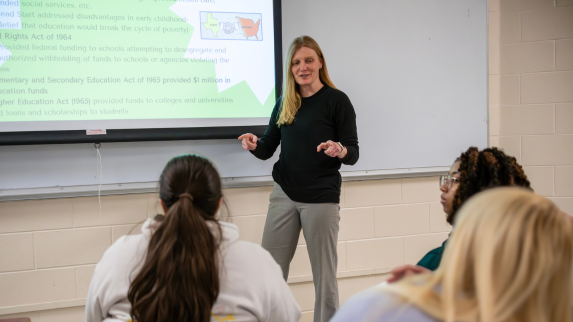Unraveling the Science Behind Plant Adaptation
A lifelong problem solver with a passion for science, Maria Schwarz has found her calling in plant genetics. Now a PhD student in the Computational and Integrative Science Program, she investigates how stomata—microscopic pores on plant leaves critical for photosynthesis—develop and adapt to drought conditions. Her path, shaped by curiosity and dedication, highlights the potential of innovative research to address global agricultural challenges. Learn more about the impact of her work and the journey that brought her here.
A Love for Science That Started with a Puzzle
As a little girl, I always really enjoyed solving puzzles of all kinds, like jigsaw puzzles, puzzle-solving video games, and crossword puzzles. It was no surprise that my love for solving puzzles would eventually develop into a love of science. In 8th grade, we went over basic genetics for the first time, and something about it really spoke to me. I loved doing Punnett squares to see how different combinations of alleles would give people different physical traits. I was so excited that when I came home that day, I sat my dad down to show him how likely it was that I have brown eyes while he has green eyes. From then on, I knew that genetics was something I wanted to look into as a career.
When it came time to apply for college, I started at the County College of Morris as a Biology major. I spent 2 and a half years there and loved working in a laboratory setting. While I was there, I was given the opportunity to work on a research project to identify microorganisms in the lake on campus and how population density would affect those organisms. After I got my associate’s degree, I transferred to Ramapo College of New Jersey. I spent another 2 and a half years there and worked on another research project to identify new strains of yeast for a local brewing company and to identify the genetic differences between their ale yeast and lager yeast strains. It was also there that I was able to take some bioinformatics classes and gain a better understanding of how computational biology is a huge asset in the field of genetics. After getting my bachelor’s degree, I came here to Rutgers–Camden as a master’s student in CCIB. Dr. Qi offered me a position in her lab, and I really love working with her. My work is so fulfilling that I decided to transfer to the PhD program in CCIB once I finished my master’s, and now I get to continue working on my research and doing what I love every day.
Seeing that I had gained such a large and supportive community of fellow scientists through CCIB really meant so much to me.
Maria Schwarz
Combining Local Roots with Global Opportunities
In the Qi Lab, we focus on stomatal development in plants and how stressful growing conditions affect this development. Stomata are microscopic pores on the leaf surface of plants, and these pores facilitate photosynthesis. The development of stomata is especially important because if they do not develop properly, the plant might not be able to photosynthesize effectively or adapt to and survive through stressful conditions, such as drought. This, in turn, means that these plants produce fewer fruits and vegetables. Our group focuses on drought because, as global temperatures rise, growing crops during drought periods is becoming more prevalent in many countries. Understanding how plants respond to drought and how we can utilize our knowledge of genetics to better prepare plants to respond is imperative to ensuring we have productive plants that produce enough crops to feed people all over the world. Currently, my research is focused on Abscisic Acid, a hormone naturally produced in plants during drought conditions, and how affecting the genes related to this hormone can vastly change the stomatal development and growth of plants.

Related to this story:
Using Abscisic Acid to Engineer Drought-Resistant Plants
In the Qi Lab, we focus on stomatal development in plants and how stressful growing conditions affect this development. Stomata are microscopic pores on the leaf surface of plants, and these pores facilitate photosynthesis. The development of stomata is especially important because if they do not develop properly, the plant might not be able to photosynthesize effectively or adapt to and survive stressful conditions, such as drought. This, in turn, means that these plants produce fewer fruits and vegetables. Our group focuses on drought because, as global temperatures rise, growing crops during drought periods is becoming more prevalent in many countries. Understanding how plants respond to drought and how we can utilize our knowledge of genetics to better prepare plants to respond is imperative to ensuring we have productive plants that produce enough crops to feed people all over the world. Currently, my research is focused on Abscisic Acid, a hormone naturally produced in plants during drought conditions, and how modifying the genes related to this hormone can significantly change the stomatal development and growth of plants.
Celebrating Milestones with Friends and Mentors
My most memorable experience so far was definitely when I defended my master’s thesis. After months of work on my thesis, I was incredibly nervous when the day finally came to defend it. I was so surprised by how many people came to watch my defense. In fact, so many people attended that the room I booked was too small, and we had to get chairs from the room next door so that everyone would have a place to sit! Seeing all of the people from my department who came to support me and cheer me on made all of my nerves wash away, and I was just so excited to tell them about my research. When I finished my defense, some of my friends gave me a card they had made, signed by almost everyone in the department, along with flowers and desserts. My family is incredibly supportive of my work, but as a first-generation college student and the only person in STEM in my family, they do not always understand what I do. Seeing that I had gained such a large and supportive community of fellow scientists through CCIB meant so much to me.
Spotlights & Stories

Want more stories like this? Spotlights and Stories highlights alumni, faculty, staff, and student experiences through stories, video, and voice. Learn more
Explore Graduate School Programs

Rutgers Graduate School-Camden offers 20+ graduate certificates, master’s, and doctoral programs across various disciplines, including biology, data science, creative writing, and psychology. We take pride in our academic diversity. Learn more
Former Students, Get Involved

Stay connected with Rutgers-Camden! Engage with former students, attend events, and support current students. Your involvement strengthens our community and helps shape future success. Learn more
